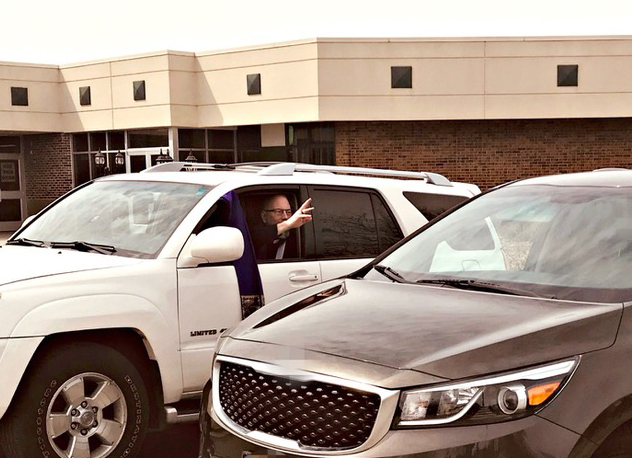
Father Leo Rigatuso, pastor of St. Matthew the Evangelist Parish in Bellevue, absolves a parishioner during “drive-up” confessions at his parish. Father Rigatuso began the practice so that he could still minister to his flock during coronavirus restrictions. COURTESY PHOTO
News
Pandemic obliges Catholics to change faith practices
April 3, 2020
Nothing can ever separate us from God’s love.
Those reassuring words from St. Paul’s letter to the Romans (8:38) are an apt description of how priests and their congregations are responding to the changes the coronavirus has forced upon the practice of their faith.
Though public Masses and reception of Communion were temporarily suspended as of March 16, parishes are adapting in new and creative ways.
Pastors are going to great lengths to meet the spiritual needs of their flocks and minimize the separation they may feel from their church through online Masses, parking lot confessions, and other measures.
As with many other parishes around the archdiocese, parishioners at Sacred Heart Parish in Omaha have access to Masses thanks to technology.
Daily Masses are livestreamed on the parish’s Facebook page and Sunday Masses are recorded and posted on the parish website, said Father David Korth, pastor.
And his parishioners appreciate the effort.
“It’s been an overwhelming response,” he said. “I can hardly keep up with the messages that are coming in.”
“A lot of the comments are saying, ‘It’s good to see our church. Thank you so much for allowing us to experience it this way.’”
Father Korth said the Sunday Masses are produced using professional techniques with camera angles and music, while weekday Masses are simple, stationary camera productions.
“I’m doing those myself,” Father Korth said. “I’ve been jokingly saying to people, ‘This is one of the miracles of the coronavirus: It’s gotten me on Facebook.’”
Although Communion is not available, Father Korth is encouraging people to make a “spiritual Communion,” a prayer to Christ that includes the words, “Since I cannot at this moment receive You sacramentally, come at least spiritually into my heart.”
DRIVE-UP CONFESSIONS
According to Canon law, the sacrament of reconciliation cannot be conferred remotely, even with the use of technology. So priests are using new ways to hear confessions while maintaining safe distances.
Father Leo Rigatuso, pastor of St. Matthew the Evangelist Parish in Bellevue, is using “drive-up” confession on Wednesdays and Sundays to meet the needs of his parishioners and maintain personal contact.
On nice days, he hears confessions from a chair at the curb of the parish parking lot, and on other days he hears confessions from his car window as people drive alongside.
He also is offering livestreamed Masses on weekdays and Saturday afternoons, and he keeps an open line of communication with parishioners by phone, email, text and social media.
“There’s a need,” Father Rigatuso said. “ The uncertainty of this whole thing has touched some spiritual nerves. But God will see us through this, he has not abandoned us. There is hope.”
“Right now, we’re just trying to listen to see where people are at, how they’re feeling and what they’re needing,” he said.
THEIR SHEPHERD’S VOICE
And that personal attentiveness is important to the Catholic faithful, said Father Jeffrey Lorig, director of Pastoral Services for the archdiocese.
“We’re encouraging pastors to first and foremost have a voice,” he said. “They’re pastors, they’re shepherds, and so people want to hear their voice. So we’re inviting them to think about how their voice can be heard.”
It can be as simple as sending a letter or email, or continuing to produce a parish bulletin, Father Lorig said.
For example, Father Lydell Lape, pastor of St. Mary Parish in Bellevue, is using technology to regularly speak to his flock directly through what he calls “Fireside Chats.” (See accompanying article, page 4.)
And although there are many options for viewing well-produced online or televised Masses from national sources, livestreaming of parish Masses is important.
“Although the production quality may be much higher, the sheep don’t know that voice, they know their pastor’s voice,” Father Lorig said, “The more local it is, the better it is.”
OTHER SACRAMENTS
Coronavirus restrictions have disrupted other important aspects of Catholic life, necessitating postponement of some weddings, confirmations and other parish events.
However, baptisms, weddings and funeral Masses can still take place, as long as a 10-person maximum attendance is maintained, said Father Scott Hastings, vicar for clergy and judicial vicar for the archdiocese.
“Unfortunately, administering the sacraments of initiation into the faith during the Easter Vigil is likely difficult this year,” he said, so pastors are encouraged to postpone this rite until they can be celebrated with the larger parish community.
But pastors have the discretion to welcome people into the Catholic Church before restrictions are lifted, as long as the 10-person rule is observed, he said.
And, most importantly, Catholics can count on the availability of the sacraments at the crucial moment of serious illness or imminent death.
Most hospitals and nursing homes have implemented more stringent procedures for admitting visitors, including priests to administer the sacraments, such as limiting numbers of visitors and protection protocols.
“The key thing is, we’re trying to balance goods,” Father Hastings said. “On the one hand, there is the right that Catholics have to receive the sacraments, and there’s the commensurate duty to provide them. On the other hand, there’s the pressing need to protect public health. But those who are sick and truly in need of the sacraments will receive them.”
